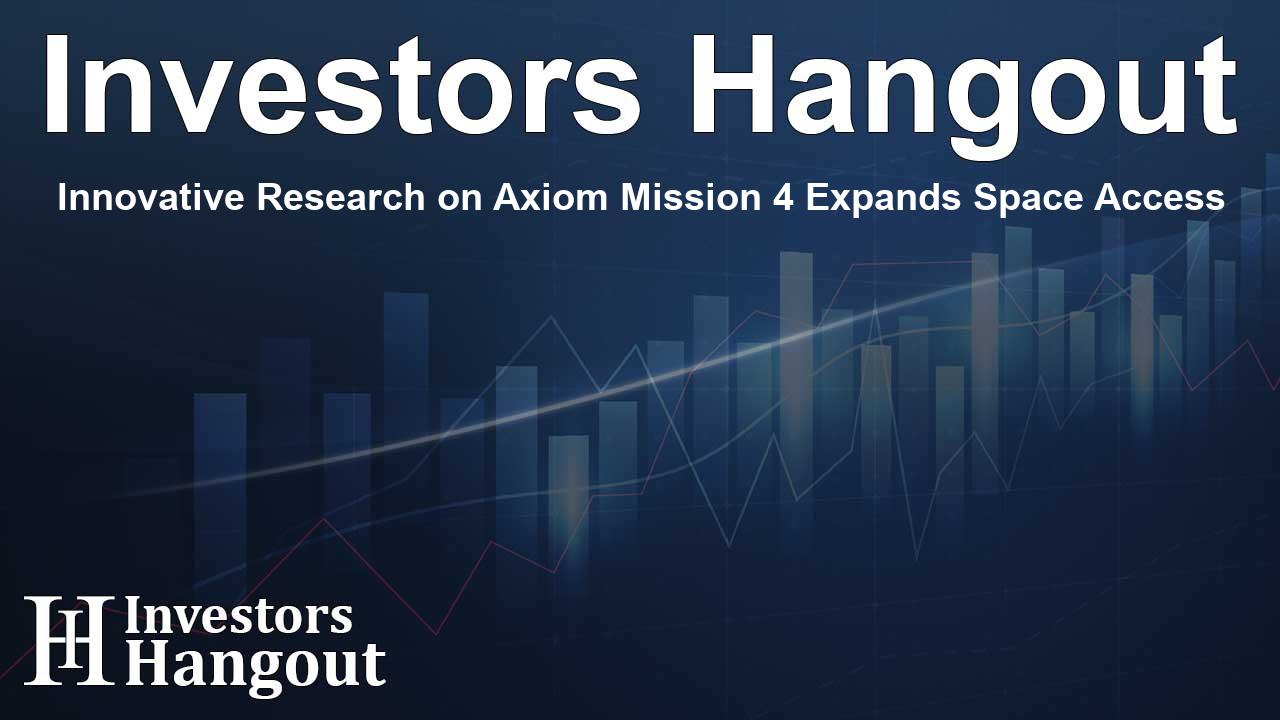Innovative Research on Axiom Mission 4 Expands Space Access

Axiom Mission 4: Pioneering Research in Human Space Travel
Axiom Space's upcoming fourth private astronaut mission is set to break new ground in space research. With multiple experiments aimed at improving human health and performance in space, this mission is eagerly anticipated by scientists worldwide.
An Expansive Research Agenda
Scheduled to take off aboard a SpaceX Falcon 9 rocket, the mission comprises over sixty experiments from 31 countries, showcasing the global interest in leveraging the International Space Station (ISS) for scientific exploration. This collaboration with experts underscores Axiom Space's commitment to embracing diverse research fields while advancing our understanding of microgravity.
Exploring Diabetes in Space
One of the key areas of focus for Axiom Mission 4 is diabetes. With over 500 million individuals diagnosed globally, there’s a pressing need to explore how this condition can be managed in space. Axiom Space has partnered with Burjeel Holdings, providing a unique opportunity to study astronauts with insulin-dependent diabetes. This groundbreaking project will assess glucose monitoring technologies, evaluate the viability of insulin in space, and study how astronauts can manage their condition during missions. Successful outcomes could revolutionize the way individuals with diabetes participate in space exploration.
Enhancing Cancer Research
The mission will also feature innovative research efforts aimed at early cancer detection. Cancer cells behave differently in microgravity, making this laboratory a unique setting to study growth patterns and response to treatments. By utilizing tumor organoids, researchers from the Sanford Stem Cell Institute plan to build upon previous findings and further investigate the mechanisms of cancer growth in space. The insights gained could significantly impact cancer therapies on Earth, particularly for aggressive forms of the disease.
Embracing Technology for Health Monitoring
Another exciting experiment led by Booz Allen Hamilton will explore the potential of wearable technology in monitoring astronauts' health in real-time. The Oura Ring, worn by crew members, will capture important health metrics, such as heart rate and sleep patterns, providing critical data to optimize health and performance during missions. This biometric information is not only vital for individual astronaut health but could also inform practices that benefit various fields on Earth.
Understanding Human Perception and Plant Growth
Astronauts often experience unique perceptual challenges during spaceflight. A study from the Hungarian to Orbit (HUNOR) Astronaut Program aims to understand how microgravity affects sensory perception and spatial orientation. This knowledge is essential for enhancing astronauts' mental well-being and ensuring mission success. Additionally, growth experiments focusing on plant biology may uncover insights that improve nutrition during long missions and influence sustainable agricultural practices on Earth.
Collaborative Efforts Shaping Our Future
Axiom Space's research endeavors on this mission are a testament to the power of collaboration between various organizations. The support from the ISS National Lab emphasizes a new era of private astronaut missions, where partnering with diverse entities can bring transformative advancements. From addressing global health issues to enhancing our understanding of life sciences, Axiom Mission 4 represents a pivotal moment for space exploration and research.
Frequently Asked Questions
What is the main aim of Axiom Mission 4?
Axiom Mission 4 aims to conduct groundbreaking research in various fields, particularly focusing on diabetes management and cancer detection in microgravity.
How many experiments will be conducted during the mission?
Over sixty experiments from thirty-one countries will be conducted, showcasing the global demand for research in low Earth orbit.
What advancements are expected from the diabetes research?
The diabetes research aims to demonstrate that individuals with insulin-dependent diabetes can safely manage their condition during short missions, potentially expanding access to space for more people.
How will cancer studies benefit from this mission?
Studies on cancer growth in microgravity could uncover insights into treatment responses, offering valuable information for developing new therapies.
What role does technology play in monitoring astronaut health?
Wearable devices like the Oura Ring will help monitor health metrics, enabling real-time feedback that can aid in optimizing astronaut performance during missions.
About The Author
Contact Dylan Bailey privately here. Or send an email with ATTN: Dylan Bailey as the subject to contact@investorshangout.com.
About Investors Hangout
Investors Hangout is a leading online stock forum for financial discussion and learning, offering a wide range of free tools and resources. It draws in traders of all levels, who exchange market knowledge, investigate trading tactics, and keep an eye on industry developments in real time. Featuring financial articles, stock message boards, quotes, charts, company profiles, and live news updates. Through cooperative learning and a wealth of informational resources, it helps users from novices creating their first portfolios to experts honing their techniques. Join Investors Hangout today: https://investorshangout.com/
The content of this article is based on factual, publicly available information and does not represent legal, financial, or investment advice. Investors Hangout does not offer financial advice, and the author is not a licensed financial advisor. Consult a qualified advisor before making any financial or investment decisions based on this article. This article should not be considered advice to purchase, sell, or hold any securities or other investments. If any of the material provided here is inaccurate, please contact us for corrections.
